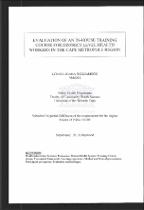Evaluation of an in-house training course for district level health workers in the Cape Metropole region
Abstract
The stated aim of training in courses run by the Health lnformation Systems Programme (HISP) is to empower facility and district level staff to use locally generated information to improve coverage and quality of primary health care services. As the level of effectiveness of training was not known, it was essential that, prior to a national expansion of training, an evaluation be done. The aim of the study was to evaluate the quality of a current, in-house training course, Certificate in information Management, in order to determine whether the goals of
training are being met and to identify areas for improvement. An evaluation was made of the course design process, course implementation and participant perceptions of the learning experience. A cross-sectional descriptive study design using both qualitative and quantitative
techniques was used. Data collection included an audit of documentation, direct observation and interviews. The study population comprised key informants, trainers and participants. Purposive sampling was used to select key informants and trainers, convenience sampling was used to select participants from the training courses selected for the study. The results showed that although the course was well received, training did not result in a change in practice. The main barriers to application of skills acquired, were poor organisational infrastructure, lack of management support and a poorly established culture of information use at district level. Weaknesses in the course design highlighted inappropriate selection, poor contextualisation of content, and a failure to provide effective post training support, as areas requiring improvement. Recommendations relate to changes required in the course design process, establishment of an administrative infrastructure and the need for a structured evaluation methodology.

